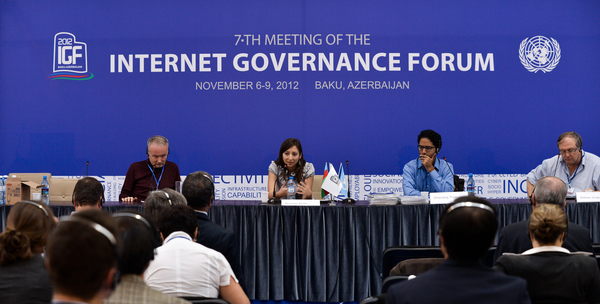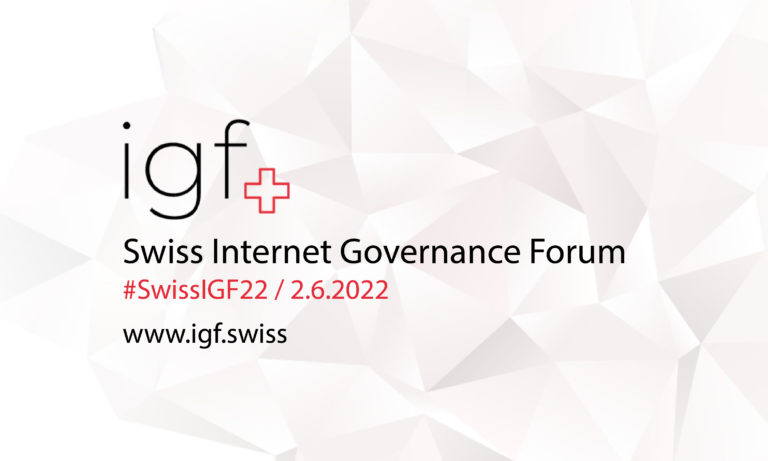Interview with Roxana Radu, member of ISOC Switzerland and ISOC Ambassador to the IGF
Roxana was present in Baku (Azerbaijan) between 5-9 November 2012 as an ISOC Ambassador to the 7th Internet Governance Forum (IGF) and shared with us her experience in the interview below.
What were the key issues discussed at the IGF?
The overarching theme of the 2012 IGF was ‘Internet Governance for Sustainable Human, Economic and Social Development’ and it gathered more than 1500 participants from 128 countries. Among the key issues discussed were: respect for human rights (online and offline), intellectual property regimes, privacy and security, access and diversity, as well as potential challenges to the current internet policy-making in the advent of the World Conference on International Telecommunications to be held in Dubai in early December 2012. The discussions also highlighted the role of the internet as an enabler of mobilization around the Arab Spring and its key role in development more broadly; freedom of expression was lively debated in particular with reference to the local context, Azerbaijan holding a very poor human rights record and making the headlines for the imprisonment of bloggers.

What did your participation consist in at the IGF?
As an ISOC Ambassador to the 7th IGF, I was part of a team of 17 young leaders from around the world with diverse expertise and backgrounds, all sharing a strong interest in shaping the way in which future internet policies look like. We shared our views by participating in workshops, engaging in discussions, meeting new people and voicing the concerns of our local communities, in the belief that ‘the internet is for everyone’.
During the IGF, I was also a panelist in two workshops. The first of them dealt with the compatibility between the freedom to share and intellectual property rights and explored ideas around alternative models that would allow for the legal exchange of content between users. The second workshop focused on human rights on the internet and related legal and technological challenges. Both of them engaged the audience in a forward thinking exercise and pushed the discussions further in a multi-stakeholder format.
How have you been involved in internet governance so far and how does your participation at the IGF complement that?
I’m currently a PhD candidate in International Relations/Political Science at the Graduate Institute of International and Development Studies in Geneva, where I conduct research on the ways in which the governance of the internet is negotiated in the framework of regional and global institutions. Before starting my PhD, I worked as a program coordinator and researcher with the Center for Media and Communication Studies (CMCS) at the Central European University in Budapest. My work focused on (new) media regulation, social uses of new technologies, and civil society empowerment. After completing several e-learning modules on internet governance and ICT policies, I had the chance to participate in the EuroDIG in 2010 (Madrid) and 2011 (Belgrade).
In 2011 I was also part of the Next Generation Leadership programme of the Internet Society (ISOC). The IGF offered me the hands-on experience of discussions and interactions that lead to (re)structuring policies that affect our lives, directly or indirectly. This is of crucial importance for involvement, and having a seat at the table does offer a very different perspective on the negotiations. Apart from being a great learning opportunity, it constantly challenges you to engage in deliberations that accommodate the different points of view and solutions.
What are your take-aways from IGF 2012?
I left Baku with a lot of enthusiasm and energy to continue the discussions started at the IGF. We have talked about enhanced cooperation and now it is time to put that into practice in innovative ways. The issue of rights in connection with the internet underlined a series of workshops, with the understanding that legal and political decisions need to be reached in a transparent and inclusive manner; thus, future work should focus on raising awareness in different local communities and I hope to contribute to that. Ensuring the free flow of information continues to be a high priority, especially in light of recent internet blackouts in Syria and of the different attempts at curtailing global connectivity around the world.
Another direction for further action is, from my point of view, the engagement of young people and of women in internet governance, especially those coming from developing countries. While these groups were present at the 7th edition of IGF in higher numbers than at previous IGFs, more can be done to have them more actively involved as stakeholders. The ISOC Ambassadorship program represented a deeply-needed bridge between local communities and global debates, and similar initiatives should be supported on a larger scale.
Geneva, 3 December 2012

